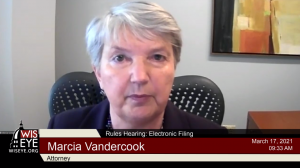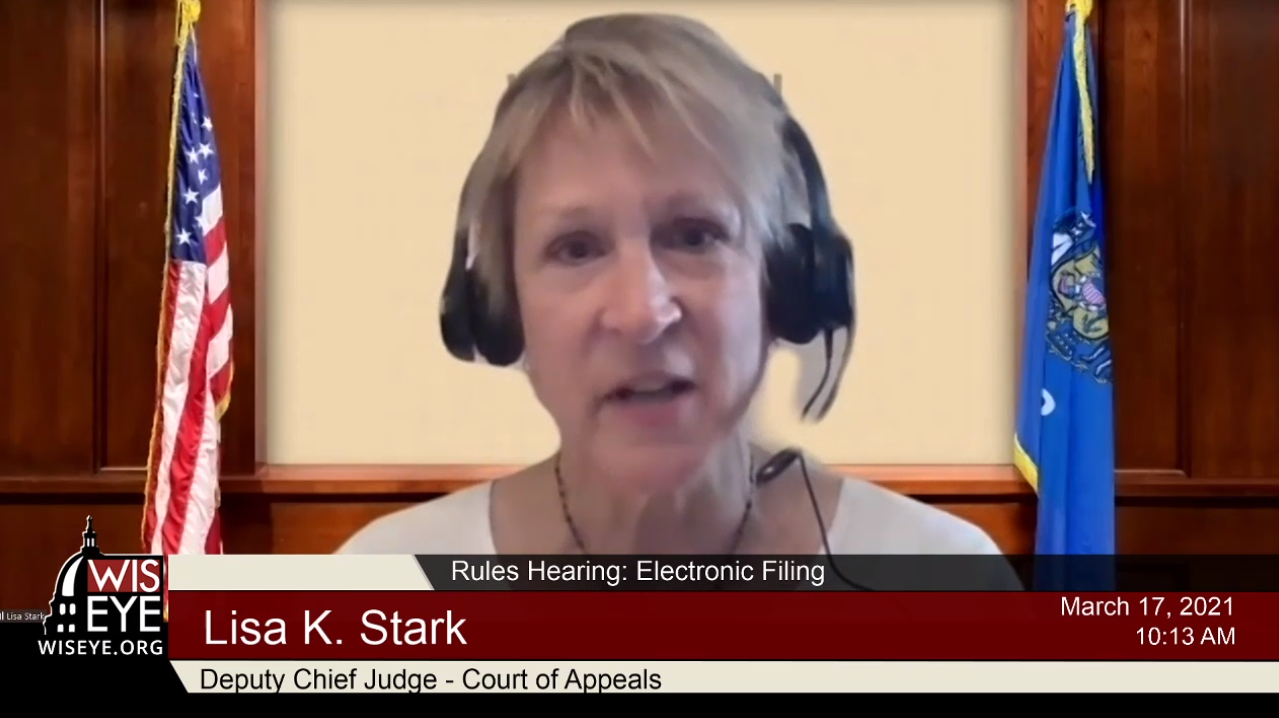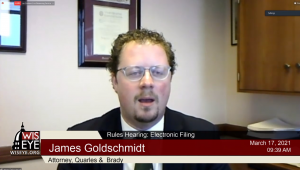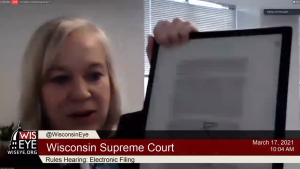Attorneys, judges, CCAP eager for Supreme Court to approve mandatory appellate e-filing rule
By: Michaela Paukner, [email protected]//March 17, 2021//
Attorneys, judges, CCAP eager for Supreme Court to approve mandatory appellate e-filing rule
By: Michaela Paukner, [email protected]//March 17, 2021//
Attorneys, judges and CCAP staff called on Wednesday for the Wisconsin Supreme Court to approve mandatory electronic filing in the state’s Courts of Appeals.

The state Supreme Court held a public hearing Wednesday on Rule Petition 20-07, which asks the high court to approve mandatory e-filing in the appellate courts and amend the rules as needed to have the system in place. The proposed start date is July 1.
In 2019, CCAP began working with the Courts of Appeals and state Supreme Court on an e-filing pilot project. The purpose was to set up a comprehensive filing system similar to what’s used in the circuit courts. Attorneys have been required to file everything electronically in the lower courts since 2016. The Courts of Appeals have been accepting electronic briefs and appendices since 2009.
The clerk’s office rolled out voluntary participation for the four appellate courts in the state beginning in August, and the appellate system now accepts electronic filings for any matter.
“This process worked well for circuit-court filing, and we think it will work well for appellate filing, too,” said Marcia Vandercook, a member of the appellate e-filing committee, during Wednesday’s hearing.

District III Deputy Chief Judge Lisa Stark described the system as well-used and accepted by judges. She said they haven’t had any major concerns or missing filings, and CCAP staff has been very helpful in designing a program that meets their needs and reflects their workflows.
“This has been terrific,” Stark said. “It has not affected the ability of my colleagues to do their work.”
She estimated that about a third of judges are working entirely electronically, a third are still using paper and a third are doing a mix of both.
James Goldschmidt, attorney at Quarles & Brady and chair-elect of the State Bar of Wisconsin’s appellate practice section, said the section has strong support for the rule petition. He said members heard from appellate practitioners from around the state who are in support of e-filing.

“In fact, we would respectfully say it’s about time,” Goldschmidt said.
The section heard some concerns about educating appellate practitioners about the new process. Goldschmidt said there have been conversations with CCAP about education for attorneys, and a continuing legal education program before the July 1 start date is one option being considered.
The state Supreme Court justices asked questions about how e-filing and the judicial dashboard would function for them. Jean M. Bousquet, CCAP’s chief information officer, said CCAP would work closely with the justices to ensure the dashboard shows what they need.
“You tell us how you work and what works best for you,” Bousquet said. “We plan to be very collaborative. We’ll keep coming around until you tell us, ‘We got it. Go away.'”

Bousquet said CCAP purchased paper-sized e-readers and styluses for judges to mimic the experience of reading and notating on paper. The notes are saved and can be accessed from the reader or a computer.
“The experience of pen-to-paper with these devices is very close, so we think judges and justices will find these useful tools,” Bousquet said.
Vandercook said the proposed rule gives the state Supreme Court the ability to set its own rollout date for mandatory e-filing. The July 1 date would only apply to the appellate courts, but the state Supreme Court could aim for the same launch date if the justices are ready.
The state Supreme Court met in closed conference following the hearing and will release its decision at a later date. A recording of the public hearing is available via WisconsinEye. Follow @WLJReporter
Legal News
- Wisconsin attorney loses law license, ordered to pay $16K fine
- Former Wisconsin police officer charged with 5 bestiality felony counts
- Judge reject’s Trump’s bid for a new trial in $83.3 million E. Jean Carroll defamation case
- Dozens of deaths reveal risks of injecting sedatives into people restrained by police
- The Latest: Supreme Court arguments conclude in Trump immunity case
- Net neutrality restored as FCC votes to regulate internet providers
- Wisconsin Attorney General asks Congress to expand reproductive health services
- Attorney General Kaul releases update at three-year anniversary of clergy and faith leader abuse initiative
- State Bar leaders remain deeply divided over special purpose trust
- Former Wisconsin college chancellor fired over porn career is fighting to keep his faculty post
- Pecker says he pledged to be Trump campaign’s ‘eyes and ears’ during 2016 race
- A conservative quest to limit diversity programs gains momentum in states
WLJ People
- Power 30 Personal Injury Attorneys – Russell Nicolet
- Power 30 Personal Injury Attorneys – Benjamin Nicolet
- Power 30 Personal Injury Attorneys – Dustin T. Woehl
- Power 30 Personal Injury Attorneys – Katherine Metzger
- Power 30 Personal Injury Attorneys – Joseph Ryan
- Power 30 Personal Injury Attorneys – James M. Ryan
- Power 30 Personal Injury Attorneys – Dana Wachs
- Power 30 Personal Injury Attorneys – Mark L. Thomsen
- Power 30 Personal Injury Attorneys – Matthew Lein
- Power 30 Personal Injury Attorneys – Jeffrey A. Pitman
- Power 30 Personal Injury Attorneys – William Pemberton
- Power 30 Personal Injury Attorneys – Howard S. Sicula











